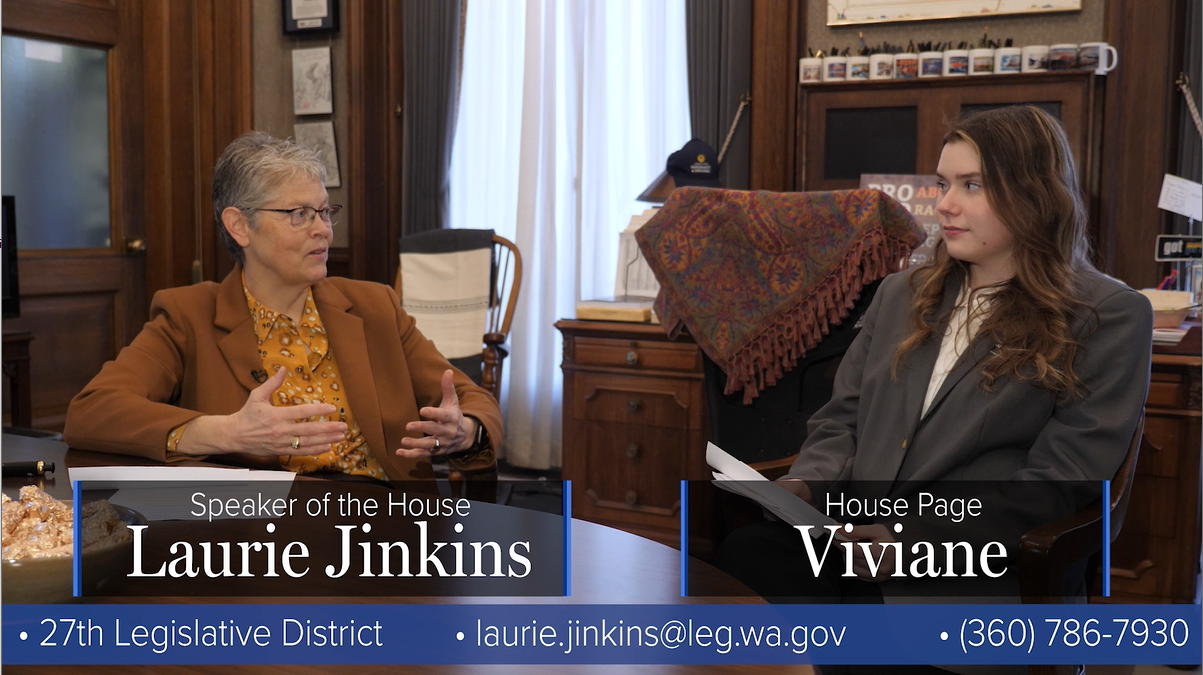—————————————————————————————————————————————————————————————————————
House rolls out “Resilient Washington Budget”

Dear friends and neighbors,
Yesterday, House Democrats rolled out our 2023-2025 state operating budget proposal, the Resilient Washington Budget.
Over the last few years we’ve set a new standard for investing in families across our state, with a focus on those disproportionally impacted by the pandemic or who have historically faced barriers to opportunities.
We’ve leveraged federal funds to expand food assistance, cash assistance, and housing programs to keep people housed and fed. We’ve increased access to childcare and post-secondary education to help address workforce development and retention. We’ve set ourselves up for a more equitable future.
In this budget we’re continuing that work, being strategic with our spending so we can maintain critical programs even as federal funding goes away. We know that people across our state are feeling the economic impacts of inflation, and many are still feeling the impacts of COVID-19. That’s why we focused on resilience. It’s not just about weathering tough times, it’s about knowing that we have your back.
This proposal makes significant investments in K-12 education, housing, workforce development, poverty reduction, and much more. It does all this with a focus on racial equity, something you’ll see woven throughout the Resilient Washington Budget. I’ve got some details about the budget below, but if you want to read more about the Resilient Washington Budget you can do that here, or head to fiscal.wa.gov for details.

 K-12 Education: Education, particularly special education, is a top priority this year. With $1.9 billion in new funding, we are investing in students, educators, and schools. Our budget proposal:
K-12 Education: Education, particularly special education, is a top priority this year. With $1.9 billion in new funding, we are investing in students, educators, and schools. Our budget proposal:
- Provides funding for inflation adjustment and health care cost increase for educators – $570 million
- Increases funding for supports for special education students- $179 million
- Expands funding for access to free meals for students- $85 million
- Increases funding for dual language grants – $10 million
Homelessness and Housing: House Democrats believe that we must invest more in housing and homelessness. From working to right the wrongs of the past by providing assistance for first time homebuyers who hold identities that have historically experienced housing discrimination, to increasing funding for housing and homelessness assistance, we are moving forward on supportive housing and homeownership. Our budget proposal:
- Continues funding for emergency housing and rental assistance – $175 million
- Funds the covenant home ownership program which helps communities that have historically experienced housing discrimination buy a home – $150 million
- Allocates additional funds for encampment response and outreach – $60 million
- Increases funding for Housing and Essential Needs – $27 million
- Expands funding for children and youth homelessness – $28 million
Public Health and Health Care: We saw in the pandemic how undocumented immigrants were disproportionately impacted by lack of health care access. Up to one-third of our uninsured residents are undocumented adults. House Democrats are expanding health care access and Cascade Care subsidies to those individuals and families so they can get appropriate medical care. We also must stabilize our health care delivery system including hospitals, family practice, and pediatric providers. And because Democrats believe we must protect the right to abortion and gender-affirming care, we’re adding funding for providers to meet the demand caused by the US Supreme Court’s Dobbs ruling. Our budget proposal:
- Provides funding for health equity for undocumented adults – $99 million
- Increases rates for health care workers including primary care and pediatricians – $68 million
- Funds Cascade Care for individuals with lower incomes who are not Medicaid eligible – $25 million
- Maintains our commitment to public health with $362 million in new funding
- Provides funding for reproductive health services – $17 million
 College and Workforce Investments: House Democrats are ensuring everyone has the support they need to get a degree or credential, whether you’re an individual with low-income, the first in your family to go to college, or a parent returning to school. Investing in the people of our state helps everyone thrive and grows our workforce for the future. In addition to expanding higher education support with $795 million in compensation, our budget proposal:
College and Workforce Investments: House Democrats are ensuring everyone has the support they need to get a degree or credential, whether you’re an individual with low-income, the first in your family to go to college, or a parent returning to school. Investing in the people of our state helps everyone thrive and grows our workforce for the future. In addition to expanding higher education support with $795 million in compensation, our budget proposal:
- Increases workforce development and opportunity at Community and Technical Colleges – $67 million
- Funds health care workforce and training – $45 million
- Provides funding to expand Washington College Grant – $20 million
- Funds student basic needs to make sure students have the support they need to get a degree or credential – $9 million
- Increases funding for high demand enrollments – $7 million
Join me this Saturday for a Town Hall
Dear Friends and Neighbors,
This is just a quick reminder about our town hall this Saturday, March 18th from 10AM-12PM. Come ask questions and get an update on our work this session. We’ll be on the Tacoma campus of the Evergreen State College (1210 6th Ave Tacoma, WA 98504).
You can submit question in advance online: https://www.surveymonkey.com/r/27thLDtownhall2023
Or by email: OfficeofSpeakerJinkins@leg.wa.gov
Hope to see you there!
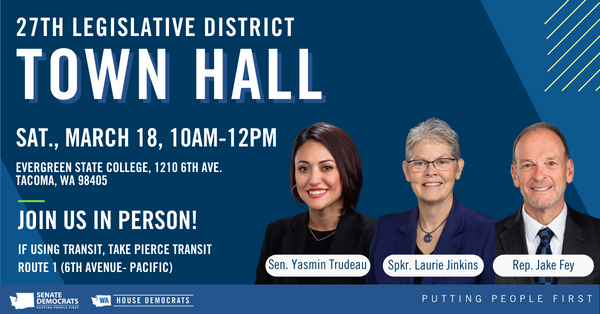

Session Update: Floor Action, an Upcoming Town Hall, the Page Program, & more
Dear friends and neighbors,
This week was the House of Origin Cutoff in Olympia, which means we’ve crossed the deadline for most bills to pass out of the House (or Senate, for Senate bills) and move over to the other chamber. It’s been a remarkably productive session so far – we’ve passed 328 bills off the House floor, with nearly 200 receiving unanimous support and over 250 receiving strong bipartisan support.
We’ve had a strong focus on housing, workforce development, and reproductive health. I think that’s reflected in the bills we’ve passed so far. Some highlights include:
- Expanding our state’s middle housing supply by allowing more diverse housing options in residential neighborhoods. (HB 1110)
- Making it easier to build Accessory Dwelling Units (HB 1337)
- Shielding patients who seek reproductive or gender-affirming care in Washington state, and their health care providers, from other state’s archaic laws (HB 1469)
- Ensuring that health care providers in Washington state are protected when providing reproductive or gender-affirming care (HB 1340)
- Protecting your sensitive health data, including data related to reproductive health (HB 1155)
- Addressing our home care workforce shortages by updating certification requirements and reducing licensing fees for home care workers (HB 1694)
- Growing our behavioral health workforce by supporting those studying to enter the field, reducing barriers to entering the workforce, and streamlining licensing requirements (HB 1724)
Now we’re pivoting back to committee hearings to look at the bills sent over from the Senate, and I’ll keep you posted on that work.

Join us for a Town Hall
I’ll be joining my seatmates for a town hall next Saturday, March 18th at 10AM. Come ask questions and get an update on our work so far. We’ll be on the Tacoma campus of the Evergreen State College (1210 6th Ave Tacoma, WA 98504).
You can even submit question in advance online: https://www.surveymonkey.com/r/27thLDtownhall2023
Or by email: OfficeofSpeakerJinkins@leg.wa.gov
House Page Program
Now that we’re back in-person we’ve restarted our House Page Program! This is an opportunity for students from 14-17 years old to come to Olympia for a week and learn more about how our state legislature works. If you want to learn more about the program check out this interview I did with Viviane, who paged in the Houselast week!
WAVE Scholarship for Career and Technical Education
I also wanted to share a scholarship opportunity for high school graduates who are enrolled in a career and technical education program. This program helps support current students and grow our workforce, and I’m excited about the opportunity. You can learn more about the scholarship or apply here, the deadline to apply is March 17th.
The People’s Work

Dear friends and neighbors,
Hello from Olympia, where we’ve started the 2023 Legislative Session! For the first time since 2020, we’re gathering to do the people’s work in-person — a welcome change after two years of remote session.
As we start this year, I want to thank you all again for the confidence you’ve placed in me as your representative. I promise to honor that confidence with listening, hard work, and good policy. I’m also grateful to my colleagues in the House for again trusting me to serve as Speaker of the House. I gave remarks after I was sworn in Monday in which I talked about what House Democrats will be focusing on this session. You can watch those here.
Looking ahead – I’m proud of how well Washington has weathered the last two years, but I know we still have work to do.
Housing
I know that there are families struggling to find accessible and affordable housing across our community and across the state. We need to build 1.1 million homes within the next couple decades to meet our current and future housing needs. Almost half of these homes will need to be accessible for low-income Washingtonians. This session I’ll be working with my colleagues to find creative, innovative, and bipartisan solutions to help build a stronger future for our state.
Workforce
I also know that every sector in Washington has been impacted by workforce challenges, from behavioral health to childcare, long-term care to K-12 education, public safety, and more. We’re looking at how we can grow each of these workforces, making it easier for people to get the education, training, or certification they need to provide quality services.

Last week I was on a bipartisan panel with other legislative leaders to talk about our priorities for the coming session. We may not agree on everything, but there’s a lot of common ground. In my opening remarks to the House I talked about being patient with each other and impatient about the problems we’re facing, I’m hopeful that with this approach our work together will produce better results for all Washingtonians.
This is the People’s House and I’m proud to work hard here on your behalf.

Staying Engaged this Session

Our transition to remote work over the last two sessions made the legislature more accessible than ever for our constituents. While we’re back in-person, we’re keeping those remote options for you to get involved. More information on those options is below:
- Learn — Curious about how the legislative process works? You can watch a start-to-finish overview by clicking here. If you prefer text instead, click here.
- Watch — TVW.org broadcasts all legislative debates, votes, committee hearings and other events in the House and Senate. There’s also an extensive archive of past events if you can’t watch it live. Check out TVW’s “Legislative Review” for a quick recap of everything that’s happened each day of session.
- Research — Find detailed information about legislation by lawmaker or topic by clicking here.
- Testify — Share your thoughts on legislation! This session, you’ll be able to testify in person, remotely or in writing based on what’s easiest for you. Click here for more information on how to testify.
2022 Session Victories: Bringing down costs for Washingtonians

Dear friends and neighbors,
Rising costs due to inflation are impacting all of us right now, especially working families, people on fixed incomes, and those who were already struggling to make ends meet.
While the state Legislature cannot singlehandedly solve the global inflation problem, we took action this session to help bring down costs for individuals, families, and small businesses in our state. This e-newsletter highlights many of the steps we took that will impact folks here in the 27th Legislative District and beyond.
Bringing down health care costs
Protecting you from surprise medical bills: House Bill 1688 gives patients and families peace of mind that they won’t get hit with a surprise bill after an emergency room visit. It aligns state and federal balanced billing policies, and ensures that mental health emergencies are protected from surprise bills just like other emergencies.
Lowering and capping out-of-pocket costs for insulin: Senate Bill 5546 caps the cost of insulin at $35 per month for all health plans, down from the $100 per month cap the Legislature set in 2020. Given how many Washingtonians depend on this lifesaving drug, lawmakers will continue working on ways to bring down its cost for household budgets.
Expanding access to hospital charity care for all who need it: House Bill 1616 standardizes eligibility requirements for hospital charity care across the state. It also expands access, so that no matter where you live, you can access free or reduced-cost care if you need it. This change impacts 2.2 million Washingtonians.
Allowing doula care to be reimbursed by Medicaid: House Bill 1881 creates a voluntary program for doulas who want to serve Medicaid patients. 52% of all births in Washington state are covered by Medicaid, but until now doula care was not covered, leaving families to cover the full cost out of pocket. Why is access to doula care for all important? Because doulas – or birthing assistants – help their clients navigate labor, delivery, and postpartum recovery, which leads to stronger birth outcomes and a reduction in medical interventions. Less medical interventions means lower costs overall. Additionally, in many cultures doulas have long been the primary form of support for those giving birth, making access to doulas a matter of equity.
Bringing down higher ed costs
Lowering borrowing costs for Washington students: House Bill 1736 creates a state student loan program with a low interest rate of just one percent. This is much lower than current federal student loans or private loan rates. While the state can’t cancel student loan debt, we can provide better options for students and their families so they don’t have to take on crushing debt just to get a degree or certificate.
Ensuring more families get connected with financial aid programs: House Bill 1835 increases outreach to Washington students and families so they complete the FAFSA, or Free Application for Federal Student Aid. This form is the key to accessing so many scholarships, grants and loans, but each year Washington students simply leave this money on the table because our state ranks 49th out of 50th for FAFSA completion. This outreach will help make sure that students who need help affording college or technical school can access the aid they need to get there.
Expanding the Washington College Grant and providing bridge grants: In 2019, the Legislature passed a bill creating the Washington College Grant, a major investment in our students and workforce. This grant provides free or reduced tuition at Washington’s two-year, four-year and technical colleges for families earning up to 100 percent of the state’s Median Family Income. This year, we expanded the program and funded bridge grants for the students with highest need (a $34 million investment in the supplemental budget). These grants can be used by students to pay for expenses beyond tuition, including transportation, books, and even child care.
Bringing down costs for small businesses
B&O small business tax credits: Many small businesses have not returned to their normal level of operations since the start of the pandemic. Senate Bill 5980 increases the credit that small businesses are allowed to deduct for state business and occupation taxes and increases the filing threshold, meaning 125,000 Washington small businesses will see lower B&O taxes or not even have to file at all.
Help for the hard-hit hospitality sector: While many businesses struggled due to the pandemic, those in the hospitality sector were particularly impacted by pandemic-related closures. Our supplemental state budget invests $100 million in support for these businesses, so they can keep their doors open. We also cut liquor license fees in half to help our restaurants, bars, tasting rooms and distilleries as they continue recovering.
Reduced unemployment insurance premiums: Senate Bill 5873 reduces the impact of the pandemic on
unemployment insurance premiums for businesses, keeping the cap at last year’s rate and lowering it for 2023. This will particularly help our restaurants and other small businesses that often did the right thing by keeping workers on payroll even during pandemic restrictions.
Bringing down costs for basic needs
Utility assistance: Our supplemental state budget invests $160 million in increased assistance for basic utilities (water, energy, garbage, recycling and broadband), so that the households struggling the most in our state can keep the lights on, keep the water running, and access basic services.
Food assistance: We invested an additional $94 million to help Washington families be able to put food on the table with increased food assistance. No child – or adult – should go to bed hungry at night.
Rent and housing assistance: Our two-year state operating budget invests big (over $1 billion) in rent assistance to help keep people housed even if they’re currently struggling financially. We increased available funding for rent assistance by another $68 million in this year’s supplemental budget. Keeping people from ending up homeless is a big priority, and that’s why we also passed the Apple Health and Homes Program, which provides a housing benefit and community support services to those struggling with chronic physical or behavioral health conditions.
More affordable housing: It’s no secret that we have a housing shortage in our state, and many people are struggling to find affordable housing. While the state has more work to do to address the housing shortage, we took a big step this session with a $500 million transfer of funds from the state’s general fund to the capital construction budget. With this funding, we can build more affordable housing, to start making a dent in the backlog and help more people find a place to call home.
Abortion rights: We won’t back down
Last week, a leaked draft opinion from the US Supreme Court seemed to indicate the Court is poised to overturn Roe v. Wade. I immediately released the following statement:
“Washington state has a long history of supporting abortion rights, reinforced by the voters time and again over many years. House Democrats, along with Senate Democrats and the Governor, have assured we maintain a safety net of abortion providers and enhanced protections for the right to choose in Washington, unlike some other states that are rolling back this fundamental right. The draft Supreme Court memo appears to confirm the Court is preparing to overturn Roe v. Wade, which will not only immediately endanger women’s health but more ominously indicates a willingness of this Court to undo many more of its own precedents. Here in Washington, we will not allow these rights and protections to be taken away. In the Legislature, Democrats in both chambers have stood strong against repeated attempts by Republicans to undermine abortion rights in our state. In the 2022 session, bills to limit or prohibit abortion were introduced in both chambers by Republican legislators, but they did not go anywhere because the Democratic majority stood strong against these attacks on basic rights. My caucus will continue to not only hold this line, but find ways to protect women from other states whose rights may be stripped away if Roe is overturned.”
I was proud to join other Democratic lawmakers from the House and Senate, as well as Governor Inslee, at a rally in Seattle to say unequivocally that we won’t back down here in Washington state when it comes to abortion rights. You can watch my remarks at the rally here:
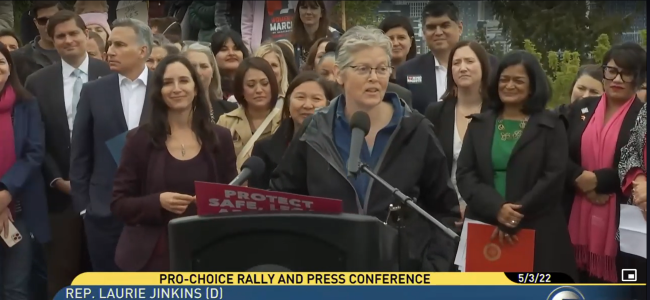
While other states are passing abortion bans and laws criminalizing abortion, often with no exceptions for rape, incest, or even ectopic pregnancies (which can be fatal), we passed House Bill 1851 this year. It expands abortion access by making clear that providers like nurse practitioners – who already have the training and experience to provide abortion care – can do so under state law. It also prohibits the state from penalizing a pregnant individual or a medical provider for an authorized abortion.
Opportunities to serve on gubernatorial boards & commissions
Did you know the governor appoints appoints citizen/community members to serve on the many state boards and commissions? It’s a way to bring more voices to the table, and ensure that the diverse array of talents, skills and experiences from all our state’s communities are represented.
The membership of the Legislature is more diverse than ever. Our boards and commissions should also reflect the diversity of this great state. The Governor’s Office is currently seeking prospective candidates to fill current and upcoming vacancies. If you are interested, you can read about the many opportunities available by clicking here. If you are ready to apply, click here.
This is my last e-newsletter until after the 2022 general election is certified. During an election year, there are certain restrictions on legislative communications to prevent the use of state resources for campaign purposes. These restrictions kick in on May 16, the first day of candidate filing week. My legislative Facebook page will also be “frozen” during this time, although all content will still be available for viewing.
Please note that I can continue to respond to constituent emails and inquiries, so don’t hesitate to reach out with any questions, comments, or concerns.
It’s an honor to serve the 27th Legislative District.
Sincerely,

Statement from Speaker Laurie Jinkins on abortion rights in Washington state
Speaker of the House Laurie Jinkins (D-Tacoma), released the following statement today in response to the draft US Supreme Court opinion suggesting the Court may be poised to overturn Roe v. Wade:
“Washington state has a long history of supporting abortion rights, reinforced by the voters time and again over many years. House Democrats, along with Senate Democrats and the Governor, have assured we maintain a safety net of abortion providers and enhanced protections for the right to choose in Washington, unlike some other states that are rolling back this fundamental right. The draft Supreme Court memo appears to confirm the Court is preparing to overturn Roe v. Wade, which will not only immediately endanger women’s health but more ominously indicates a willingness of this Court to undo many more of its own precedents. Here in Washington, we will not allow these rights and protections to be taken away. In the Legislature, Democrats in both chambers have stood strong against repeated attempts by Republicans to undermine abortion rights in our state. In the 2022 session, bills to limit or prohibit abortion were introduced in both chambers by Republican legislators, but they did not go anywhere because the Democratic majority stood strong against these attacks on basic rights. My caucus will continue to not only hold this line, but find ways to protect women from other states whose rights may be stripped away if Roe is overturned.”
2022 Session Victories: Addressing Housing Affordability and Homelessness

Dear friends and neighbors,
Our state faced a housing affordability and homelessness crisis even before the COVID-19 pandemic hit. The last two years have only made the situation more urgent.
I have heard from many of you who are concerned about rising homelessness in our district. At the same time, I know housing affordability is also a challenge in our region.
Everyone should have a roof over their head and a safe place to sleep at night. That’s the bare minimum. Yet in every corner of the state, individuals and families are struggling with housing insecurity every day, whether it’s someone sleeping under an overpass, or a family worried they won’t be able to pay the rent next month.
That’s why major investments made during the 2022 and 2021 legislative sessions addressing housing and homelessness are so critical. We also passed key policies to help keep people housed and prevent them from becoming homeless in the first place. Read more about these big wins below.
Major budget investments for homelessness and housing
Last year, legislators put $1.7 billion into rental assistance, mortgage assistance, homelessness response and permanent housing supports to ensure more Washingtonians have stable housing, especially in the midst of the COVID-19 pandemic.
This year, we put over $350 million additional dollars into housing and homelessness support (see below), and that’s not all. We also transferred $500 million – half a billion dollars – from the state operating budget to the state capital construction budget to pay for housing construction and acquisition needs across our state.
We are taking care of our neighbors by:
- Providing increased utility assistance (broadband, energy, water, garbage, and recycling) so those struggling the most can keep these basic services ($160 million investment)
- Providing additional funds for rental assistance so people don’t fall behind ($68 million investment)
- Funding one-time stipends for homelessness and housing service providers — these front line, essential workers are serving more and more people with higher needs at this time, and as a result we are seeing worker shortages in this critical area ($55 million investment)
- Fully funding the backlog of landlord applications to the landlord mitigation fund, which covers rent payments not paid by tenants due to COVID ($27 million investment)
- Funding a grant program to help the State Department of Transportation (WSDOT) and local governments provide services for individuals living in public right-of-ways – such as under freeway overpasses – with the goal of transitioning them to housing ($45 million investment)

Bills signed promoting housing security and reducing homelessness
Apple Health and Homes (House Bill 1866) – Establishes a program providing housing and community support services to people who meet certain income and medical risk eligibility criteria. Over 70 percent of people who are chronically homeless struggle with a physical or behavioral health condition, which are very often barriers to finding stable housing. This program treats chronic homelessness as a key component of medical care, so more people can find a home and a way forward.
Reducing youth homelessness (House Bill 1905) – Provides more services and resources to ensure young people have safe, stable housing when leaving a publicly funded system of care. No young person should be released into homelessness after they’ve been in foster care or behavioral health treatment, for example.
Connecting people to housing before they enter homelessness (House Bill 1860) – Requires that patients receive housing-related care coordination services before being discharged from inpatient behavioral health settings. Homelessness and behavioral health (mental health and substance use) are deeply intertwined and unfortunately, many people are discharged from care and have nowhere to go.
Rent payments by check or money order (Senate Bill 5749) – Requires landlords to accept personal checks, cashier’s checks, or money orders for rent payments. This is a major equity issue for seniors, people with low incomes, people with visual impairments, people with limited English proficiency, and those who lack reliable internet access and online banking. Under the bill, landlords can refuse accepting a check from a renter who previously had a rent check bounce, and landlords don’t have to accept a rent check by mail if they provide a secure, on-site drop box for payments. This bill was sponsored by my 27th District seatmate, Sen. Yasmin Trudeau.
Property tax exemption for equity cooperative housing (Senate Bill 5713) – Provides a property tax exemption for limited equity cooperative housing, a low-income home ownership model. This reduces a cost barrier to home ownership for working families, and is another tool to address the need for more affordable housing in our region.

There is more work to be done to close the housing shortage gap and make sure every Washingtonian has a place to call home. As long as there are neighbors in need, out in the bitter cold or sweltering heat without a roof over their heads, I won’t be satisfied. And neither will you.
Our state can be a place where there aren’t people in crisis in the streets, and where people can have peace of mind knowing treatment and care is available for those who need it. That’s the Washington I want for all of us. The work to get us there continues, and we will keep building on the major steps taken by the legislature over the past two years.
Save the date – Community Chat on May 3rd
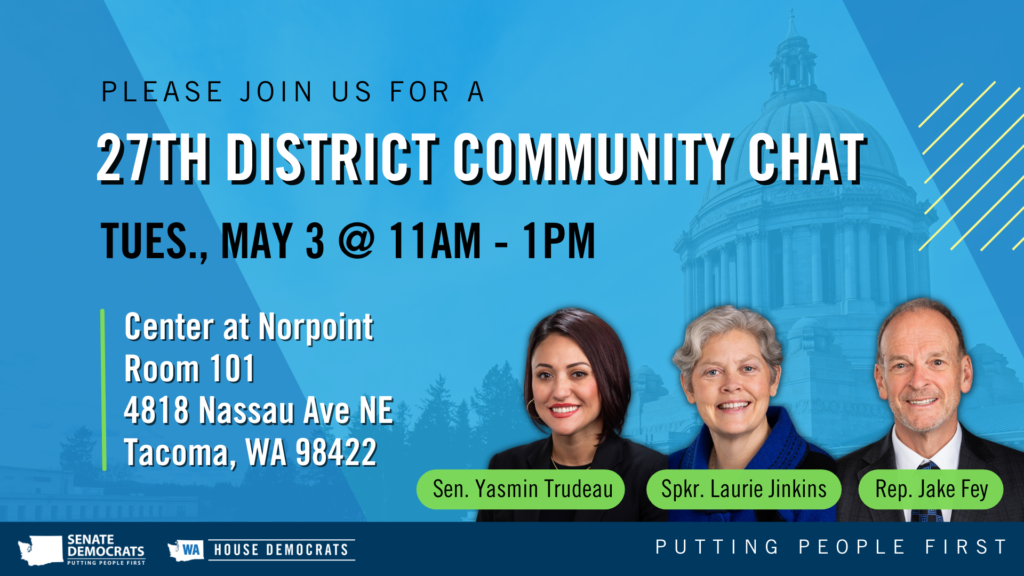
With the legislative session over, I will be hosting a couple of informal, in-person “community chats” together with Rep. Fey and Sen. Trudeau next month. The first is scheduled for Tuesday, May 3rd at 11:00 AM at the Center at Norpoint, 4818 Nassau Ave NE, Room 101.
We will take your questions and share information about the work accomplished this session for our community and our state. Hope to see you there!
As always, it’s an honor to represent you and to work on behalf of the 27th District. Please reach out to me with your questions, comments, or concerns, and I hope to see you out and about in the community this spring.
Sincerely,

2022 Session Victories: Supporting Students and Educators

Dear friends and neighbors,
The 2022 session was both historic and productive, and I’ll be providing highlights of the major accomplishments in my next several e-newsletters. This newsletter focuses on the big policy and budget wins in the K-12 education space this year.
The past two years have been incredibly difficult for our state’s students, educators, and school districts. COVID-19 brought challenges that our education system was forced to grapple with, like remote learning and quarantining. Many students and families struggled with these changes and disruptions. School district employees – educators, staff, bus drivers, cafeteria workers – were on the front lines of the pandemic.
Legislators took action this session to address these challenges with policies and investments that provide critical support to our entire K-12 system. I’m excited to share those with you below, because our children — and our community — deserve good schools.
Policy Wins

Supporting students’ mental and emotional health: I touched on this in my last e-newsletter, but it’s worth highlighting again. We know the pandemic has taken a devastating toll on the mental health of our K-12 students. Teachers, parents, and staff have been working hard to support kids through these challenging times, but there’s only so much they can do when they are already stretched so thin. House Bill 1664 brings more counselors, nurses, and social workers into our public, K-12 schools to address these urgent needs. These are exactly the trained professionals we need in our school buildings to make sure every student can move toward a bright, promising future. This bill was signed by the governor on 3/23/2022.
Ensuring ALL parents can engage in their child’s learning and development: Parental involvement is critical for students’ success. But non-English speaking parents are too often left out of their kids’ education because our schools don’t always have the resources to provide interpretation and other language access services. In some cases, students have had to translate for their parents. Washington is a diverse state, and that diversity is reflected in our schools. In one school district, over 137 different languages are spoken in students’ homes. That’s why House Bill 1153, which establishes a language access program for culturally responsive family engagement, is so important. This will help schools serve every Washington family and value the voice of each student. This bill was signed by the governor on 3/23/2022.
Less screens, more fresh air: With the shift to remote learning during the worst of the pandemic, screen time was increased for most students. While this was necessary for learning to continue, we know that some of the best lessons don’t happen on a screen – they happen outdoors, where students can experience the wonders of nature first hand. House Bill 2078 directs the Office of the Superintendent of Public Instruction (OSPI) to create a program that will award grants to support schools in offering outdoor learning. It also requires OSPI to give priority to schools that have been underserved in science education. This is yet another way to support healing and growth for our kids in the aftermath of the past few years. This bill was signed by the governor on 3/23/2022.
Ensuring kids have the fuel they need to learn, play, and thrive: It’s hard to learn on an empty stomach. Over the past few years, the Legislature has acted to expand access to nutritious meals in schools, from expanding successful programs like Breakfast After the Bell to eliminating lunch co-pays. This year, we expanded free school meals to more than 92,000 students across the state with House Bill 1878. It requires all eligible schools to participate in the Community Eligibility Program (CEP), a federal program. This is an important step on our path to ending childhood hunger in Washington state. This bill was signed by the governor on 3/4/2022.
Addressing school employee shortages: House Bill 1699 provides immediate help for our school districts that are desperate for classroom and other support. The pandemic has caused school staffing shortages, including right here in Tacoma Public Schools. One solution is for retired school employees and teachers to come back into schools to fill these gaps, but until now these retirees were limited in how many hours they could work while still receiving their retirement benefits. By temporarily increasing the cap on those hours, we can get more substitute teachers, bus drivers, and nutrition staff to schools needing some short-term help. I recently received a note from a retired teacher in our district who was grateful for this bill’s passage, as she can now step up to help with classroom coverage.
Budget Wins

I firmly believe our children deserve public schools that are safe, fully staffed, and that meet their needs. Making this happen requires investing in our schools, and that’s why House Democrats pushed to invest more, not less, in the 2022 supplemental budget.
One of our biggest K-12 investments was $360 million in the supplemental budget to fund enrollment stabilization and transportation. COVID-19 has left schools with a lot of uncertainty around funding because funds are largely based on number of students enrolled. Throughout the pandemic, enrollments have significantly fluctuated. Stabilizing state funding for schools provides the certainty they need to operate safely, secure the jobs of teachers and staff, and invest in student success.
We also provided $236 million in the supplemental budget for inflation-adjusted salary increases and costs for school districts. This funding is critical to retaining educators and staff at a time when we cannot afford to be losing these valuable employees.
We’re supporting the additional school counselors, nurses, psychologists and social workers mentioned above with an investment of $91 million in the supplemental budget, because our kids’ mental and emotional well-being is worth it.
And we put $28 million in the supplemental budget to support the Learning Assistance Program, or LAP. LAP is critical to helping students who fell behind during the pandemic get caught up in their learning, targeting those needing the most help.
All students deserve a fair opportunity to learn, grow, and develop into the next generation of innovators, creators, problem-solvers and leaders. This year, we prioritized student well-being, expanded accessibility for all, and ensured that students, educators and schools have the right resources to thrive—both during the pandemic and well beyond.
I’m proud of our K-12 investments, and I’m excited to see them make a difference right here in the 27th District.
I’m also really looking forward to visiting the 5th grade class at Sherman Elementary School, which sent me letters in strong support of the outdoor education bill. One of my favorite of those letters asked the straightforward question, “Why are you treating kids like puny mortals?” Totally fair question! I also found out that a group of young women in the class actually play “Madam Speaker” sometimes.
It will be a delight to share the good news that the advocacy of these students helped pass this bill – and many other great education policies – this year.
Meet the Team: Tony and Faith help me serve you better
I’m extremely fortunate to have two incredibly bright and talented staff members as my legislative assistants, Tony Ivey and Faith Flaherty. They help manage my schedule, respond to constituent inquiries, and keep my office running smoothly and efficiently throughout the year.
Tony is a graduate of Howard University and has previously worked as both a field organizer for an environmental advocacy organization, and as a police services specialist.
Faith is a graduate of Eastern Washington University and served as a legislative intern in the 2020 session, and also interned for U.S. Senator Patty Murray.
If you contact my office, it is likely that Tony or Faith is your first point of contact. I’m grateful to have these two as partners in service to the 27th District.
It’s an honor to represent you. Please don’t hesitate to reach out with your questions, comments, or concerns.
Sincerely,

Join our virtual town hall on Feb. 22
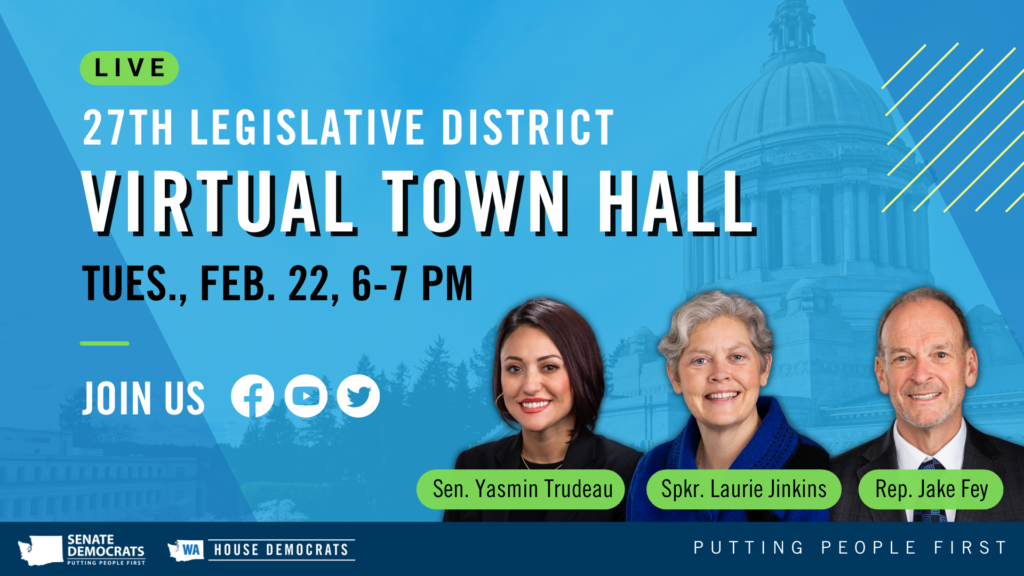
Dear friends and neighbors,
We have officially reached the half-way point of the 2022 legislative session. The cutoff for policy and fiscal bills to get out of their respective committees has passed, and now both the House and Senate are working hard to pass legislation over to the other chamber for consideration by next Tuesday, February 15th.
It’s a good time for a live check-in, so Sen. Trudeau, Rep. Fey and I will be hosting a virtual town hall for constituents of the 27th District on Tuesday, February 22nd, from 6-7 p.m.
There are several ways to tune in: the event will be livestreamed to my legislative Facebook page as well as Rep. Fey’s legislative Facebook page, to the House Democrats Facebook page, to the House Democrats Twitter feed, and to the House Democrats YouTube channel.
You can submit your questions ahead of time here: surveymonkey.com/r/27thDistrictTownHall
Questions can also be submitted live during the event by entering them in the comments section. We will try to get to as many of your questions as possible during the event.
Can’t make the live event? Submit your question anyway and you’ll be able to watch the event at your convenience on the platforms mentioned above.
We’re looking forward to hearing from you and answering your questions.
Move Ahead Washington transportation package reflects historic listening process, invests in a sustainable future for all
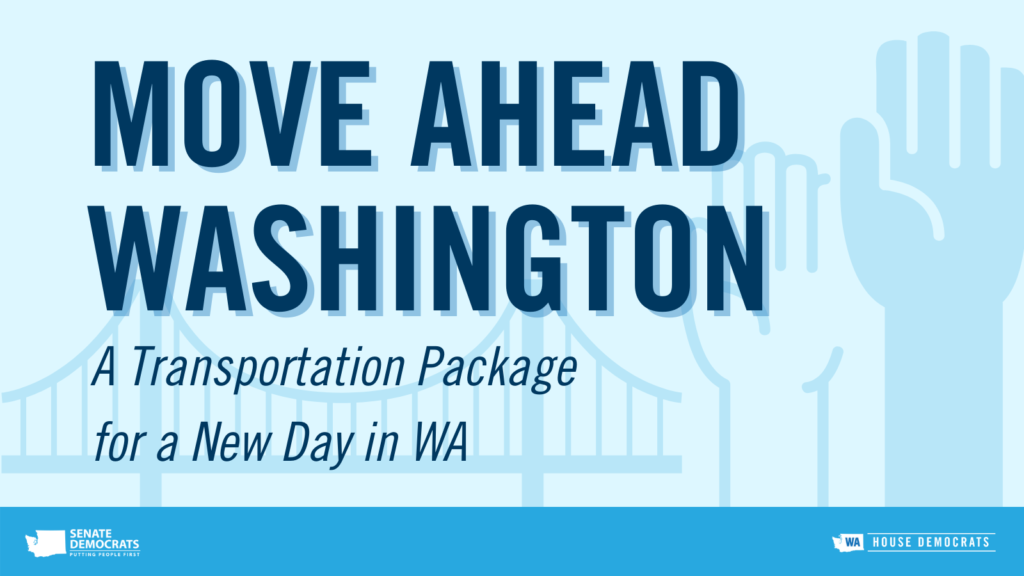
On Tuesday, Rep. Fey and his transportation team, together with their Senate counterparts, rolled out a transformational, 16-year transportation package for our state.
Called the Move Ahead Washington package, it reflects the concerns and priorities shared by communities in the 90+ listening sessions Rep. Fey – who chairs the House Transportation Committee – and his team held across the state.
This is truly a sustainable and achievable transportation future for Washington.
The priorities in the Move Ahead Washington package align well with the priorities House Democrats are focusing on this session:
- Preserving our state’s infrastructure (our roads, bridges, ferries, and sidewalks) aligns with our top-level focus on strengthening economic well-being, because we can’t move people and goods efficiently if our infrastructure isn’t well-maintained
- Expanding safe, accessible, affordable options to get around aligns with our top-level focus on serving Washington better, because Washingtonians deserve convenient, accessible transportation options
- Addressing the harm caused by past transportation policies aligns with our top-level focus on advancing racial equity and justice, because communities of color – along with low-income communities – have borne a disproportionate share of the harm of previous transportation policies
- Reducing carbon emissions aligns with our top-level focus on addressing the climate crisis, because investing in everything from zero-emissions ferry technology to bicycle and pedestrian grants to electric vehicle charging stations is meaningful action against climate change.
I’m excited about what Move Ahead Washington will do for our state, and I look forward to the conversation in both chambers and with the public about this proposal as it moves through the Legislature. Bring your questions to our town hall on the 22nd!
Thanks for reading. It’s an honor to represent you, and I look forward to taking your questions at our town hall. Hope you can join us.
Sincerely,

WA Cares improvements, bringing down costs for Washington families
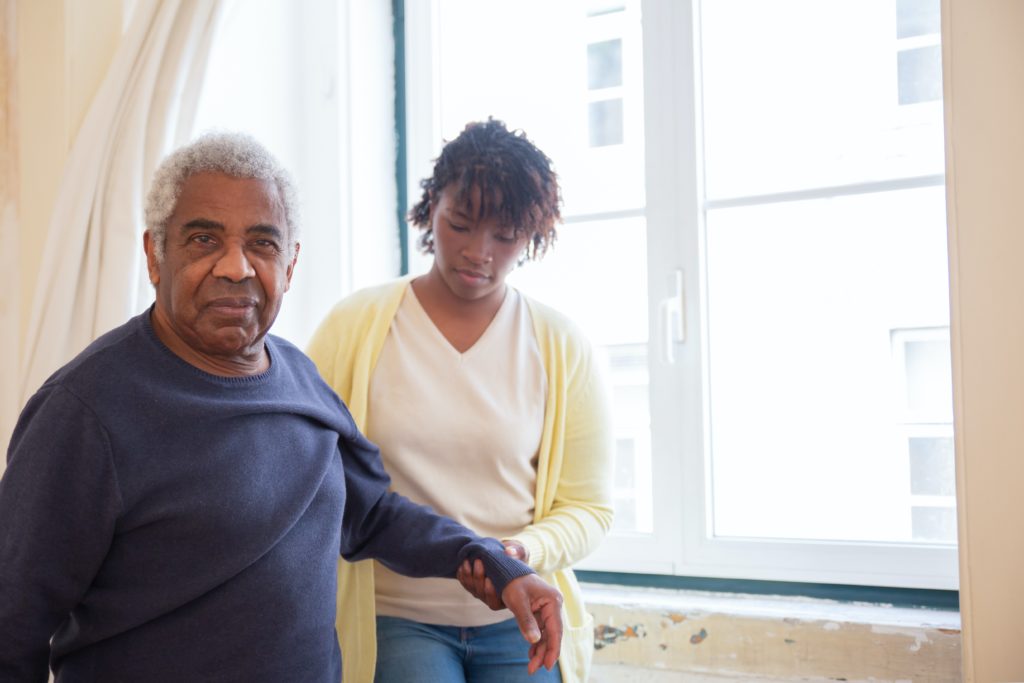
Dear friends and neighbors,
It is Week 3 of the 2022 legislative session, which means we are already over a quarter of the way through it. That’s how quickly things move in a 60-day session!
I’m excited to share that this week the governor signed two key bills to improve the WA Cares Fund, the long-term care benefit that will help more Washingtonians access the care they need as they age so they can stay in their homes longer. The House took early action to pass those bills last week.
The two bills are:
HB 1732, sponsored by House Majority Leader Pat Sullivan, which pauses the program for 18 months to allow lawmakers to implement reforms to expand access to the program to those closer to retirement than the original legislation allowed. During this time, employers won’t have to collect premiums and any premiums already collected will be refunded.
HB 1733, sponsored by Rep. Dave Paul, which enables military spouses, disabled veterans, border state residents, and non-immigrant visa holders to voluntarily exempt themselves from the WA Cares program. Concerns were raised that these folks would pay premiums but would never receive the benefit.
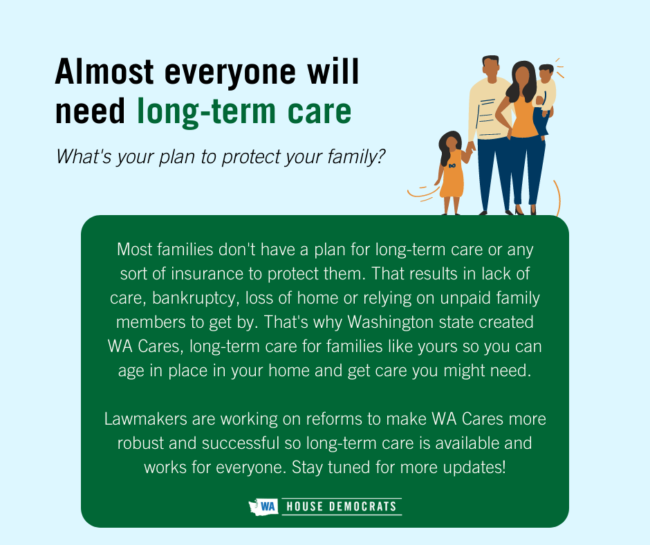
I’m glad we moved quickly to make sure the WA Cares Fund is even more accessible, flexible, and works for everyone. This critical benefit provides more options, so people don’t have to first spend themselves into poverty to access long-term care, or be denied coverage due to pre-existing conditions.
This story from Crosscut highlights why it’s so important for our state to have this life-changing benefit available. Most people don’t have long-term care insurance policies or enough savings to pay for the care they will need as they age. But even those who do have private long-term care policies can find themselves struggling, as the Crosscut article shows. That’s not right, and it’s why we need WA Cares.
While I am thrilled the reforms to WA Cares passed both chambers with strong bipartisan majorities, some legislators say they’d prefer to “repeal and replace” WA Cares. We’ve heard that phrase before in our national discourse, and it isn’t associated with helping more people get the care they and their families need.
Bottom line: Democrats have led the way this session in taking steps to strengthen the WA Cares Fund and address any outstanding issues so it can do what was intended: help people access care, and bring down costs for those struggling to pay for it.
Bringing down costs for Washington families

In my opening day of session remarks, I said this legislative session was going to be about moving EVERYONE forward.
One way to help people move forward is to bring down costs that people are paying in our state, and my colleagues in the House Democratic Caucus are championing bills that do this:
For students and families struggling to pay for college, there are proposals to expand the Washington College Grant, our state’s nation-leading financial aid program that provides free or reduced tuition for students from middle- and low-income families. By providing additional flexible dollars that can be used for housing, food, transportation, books and child care, HB 1659 would address costs that are a burden to many students but aren’t currently covered by the Washington College Grant.
For students who don’t qualify for the Washington College Grant, HB 1736 establishes a low-interest (one percent!) student loan program, to reduce borrowing costs and help those who want to avoid higher-rate federal or private loans.
When it comes to health care, it’s hard enough to pay for medical expenses you can plan for, but unexpected medical bills can totally derail a family’s finances. That’s why I’m excited about HB 1688, which protects consumers from charges for out-of-network health care services. It aligns state law and the federal No Surprises Act, addressing coverage of treatment for emergency conditions.
And one of the most costly times of the year for families is back-to-school season. Those costs can really add up, as I remember well from school shopping for my son. As we look for ways to invest one-time funds the state has by putting it back in people’s pocketbooks, a sales tax holiday a great way to do this.
HB 2018 would suspend the state sales tax this year on Sept. 3, 4, and 5 for certain items priced $1,000 or less, including clothing, school supplies, computers, durable medical goods, and energy efficient appliances.
A sales tax holiday would have an immediate impact on family budgets as they plan for purchases this fall, and would give a boost to our small and main street businesses as well.
These are just some of the ideas House Democrats are bringing forth to help bring down costs for families across our state. I hope we see every one of these bills make it to the governor’s desk.
As always, I want to hear from you. If you have questions, comments, or concerns about anything in this newsletter or another legislative issue, don’t hesitate to reach out.
It’s an honor to represent you in the state House.
Sincerely,


